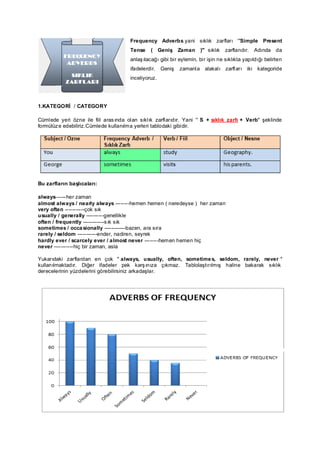
Sıklık zarfları konu anlatımı
- 1. Frequency Adverbs yani sıklık zarfları ''Simple Present Tense ( Geniş Zaman )'' sıklık zarflarıdır. Adında da anlaş ılacağı gibi bir eylemin, bir işin ne sıklıkta yapıldığı belirten ifadelerdir. Geniş zamanla alakalı zarfl arı iki kategoride inceliyoruz. 1.KATEGORİ / CATEGORY Cümlede yeri özne ile fiil aras ında olan sıklık zarflarıdır. Yani '' S + sıklık zarfı + Verb'' şeklinde formülüz e edebiliriz.Cümlede kullanılma yerleri tablodaki gibidir. Bu zarfların başlıcaları: always------her zaman almost always / nearly always --------hemen hemen ( neredeyse ) her zaman very often -----------çok sık usually / generally ----------genellikle often / frequently ------------s ık sık sometimes / occa sionally ------------bazen, ara sıra rarely / seldom -----------ender, nadiren, seyrek hardly ever / scarcely ever / almost never --------hemen hemen hiç never -----------hiç bir zaman, asla Yukarıdaki zarflardan en çok '' always, usually, often, sometime s, seldom, rarely, never '' kullanılmaktadır. Diğer ifadeler pek karş ınıza çıkmaz. Tablolaştırılmış haline bakarak sıklık derecelerinin yüzdelerini görebilirsiniz arkadaşlar.
- 2. Birkaç örneğe şöyle bir göz atalım. 1.Kemal always sings in Frenc h. ( Kemal, her zaman Fransızca şarkı söyler. ) 2.I sometimes feel bad. ( Ben bazen kötü hissederim. ) 3.Melda usually goes to the cinema. ( Melda, genellikle sinemaya gider.) 4.We never smoke. ( Biz hiç sigara içmeyiz. ) 5.Tom and Sally rarely see each other. ( Tom ve Sally, nadiren birbirleriyle görüşür. ) Şeklinde örneklerimizi çoğaltabiliriz. Dikkat edilmesi gereken yer ''Özne ile fiil '' arasına gelen sıklık zarfları olduklarıdır. Şimdi konu hakkında biraz daha derinleşelim. Önceki derslerden hatırlayacağınız üzere , ''to be ( am ,is,are ) '' da aslında geniş zaman ifadesidir. E vet fiilimiz illa ki gitmek, gelmek gibi bir fiil olmaz zorunda değildir. ''To be'' nin de başlı başına bir fiil olduğunu önceden belirtmiştik. Peki bu zarfların '' to be '' ile kullanımı var mıdır? Tabi ki vardır. Ancak konu başında belirttiğim nerede yaz ılacağı formülünden biraz farklı olarak. Sıklık zarflarımız ''am, is, are'' dan sonra gelir.Şöyle bir karş ılaştırma yapalım: He always goes to work late.( O her zaman işe geç gider ) He is always late for work. ( O her zaman işe geç kalır. ) Olumsuz cümlelerde ise sıklık zarflarının yeri ise biraz değişmektedir. Madde madde yazacak olursak . ;a. ''always '' daima olumsuzluk eki olan ''not'' tan sonra gelir. She doe sn't always wake up early. ( O her zaman erken kalkmaz. ) I am not always happy. ( Ben her zaman mutlu değilim. ) b. ''frequently, occasionally ve sometimes '' olumsuzluk ekinden önce gelir. You sometimes don't study your lessons.( Sen bazen (arasıra ) derslerine çalışmazsın. ) Bahar frequently doesn't do her homework.( Bahar, ödevlerini pek sık yapmaz. ) I occasionally don't care about myself. ( Ben genellikle kendim hakkımda pek endişelenmem. ) c. Birinci tekil şahıs olan '' I '' öznesinde yukarıdaki durum geçerli değildir. I am sometimes not modest about my career. ( Bazen kariyerim hakkında pek alçakgönüllü olamıyorum. )
- 3. d. ''usually,often ve generally '' her iki durumda da kullanılır. We usually don't pay the bills on time. ( Biz genellikle faturaları zamanında ödemeyiz. ) We don't usually pay the bills on time. ( Biz genellikle faturaları zamanında ödemeyiz. ) e.'' never, almost never, hardly ever, seldom, rarely '' zaten olums uz anlam taşımaktadır. Dolay ısıyla olumsuz cümlede kullanılmaz. Sadece olumlu cümlelerde kullanılırlar ancak olumsuz anlam taşırlar. Tıpkı yapıca olumlu anlamca olumsuz cümleler gibi. He never plays basketball. ( O, hiç basketbol oynamaz. ) You hardly ever go to a dentist. ( Sen nadiren dişçiye gidersin. ) I rarely wear suit. ( Ben nadiren takım elbise giyerim. ) f.Olumlu anlam taş ıyan sıklık zarfları ki bunlar ''occasionally , sometime s, often, generally, usually '' cümlede vurguyu artırmak için cümle baş ında kullanılabilir.Özellikle de '' sometimes ''. Sometimes Kerim starts to laugh.( Kerim bazen kendi kendine gülmey e başlar. ) Generally the people watch magazine programmes. (Genellikle insanlar magazin programlarını izler.) 2.KATEGORİ/ CATEGORY Bu kategorideki zarflar en çok cümle sonunda kullanılır.Ancak cümle başında da kullanılabilirler.Anlamsal olarak bir farklılık söz konusu değildir. Sadece cümle başında yaz ıldıklarında bu zarflardan sonra virgül (, ) gelir. En belirgin özellikleri birden fazla kelimeden oluşmalarıdır. Bu zarflar; ''every day, week, weekend, month, year '' ''once a week , twice a week, three times a week, once a month, twice a month, there times a month... '' ''several times a day,a week, a mont h, a year...'' '' in the morning, in the afternoon, in the night, at night...'' Örneklere bir göz atalım şimdi. 1.I go to the cinema once a week .( Haftada bir kez sinemaya giderim.) 2.You play football three times a month. ( Ayda üç kere futbol oynars ın. ) 3.Twice a year, we meet at a cafe. ( Yılda iki kere bir kafede buluşuruz. ) vb cümleler yazmak mümkündür.
